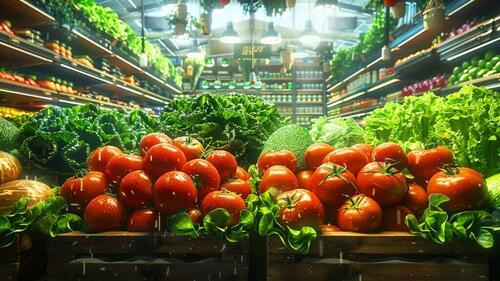Food has gotten big. Literally. A walk through the produce aisle of a 21st-century grocery store would enthrall people of any historical period other than our own. The size of tomatoes and heads of lettuce is unprecedented in the history of humankind. In just a few short generations we have become accustomed to increasingly genetically modified food. This new food is much more tasteless and durable than food of the past. Variations in soil and growing conditions allowed food grown for different reasons to possess unique regional flavors. Food grown near the place it was sold allowed taste to be prized over transportability. While many have described this decrease in food quality as a result of industrialization and the demands of efficiency, it is much more correctly enunciated to be a result of government corruption arising from a socialistic instinct.
Politicians on both sides of the aisle generally support the idea of America as a free market economy, yet they all fall victim to a basic human fallacy: “What you see is all there is.” Their desire to protect the foundation of America’s high quality of life is clouded by the lobbyists and lucrative PACs right in front of them. Timeless principles of wise governance seem unimportant and distant when a Kansan Sorghum Farmer is shedding real tears onto your office carpet. The farmer’s desire to keep things as they are infests the minds of all politicians who happen to interact with him. Small details, like the fact that he is representing a near-risk-proof corporate farm with an army of middle management, become unimportant. Smaller farms that cannot hire lobbyists will inevitably receive the short end of the stick because they have no way to remind the politicians of their existence. Fallible Politicians with a desire to make things right through government intervention rather than honor liberal principles will inevitably favor corporate farmers above both small farmers and the American populace.
Governmental inability to hold back from action has damaged the very concept of local cuisine. Small family farms already had difficulty surviving against larger farms with vast economies of scale, and government support of “American Farmers” (corporations large enough to keep perpetual spokespeople on staff) only makes this struggle more difficult. Even from an interventionist standpoint, it would be better for more unstable businesses to receive more assistance, so the free market would be perceived as better than the current situation where the strongest multi-state farms are subsidized most heavily. Local history and growing conditions converged to create a rich and multifaceted food landscape. Unique types of plants and animals were preserved as they found a valued place in the palates of locals. Slight losses of efficiency were offset by regional cuisines which reveled in distinctiveness. However, some areas of America are more conducive to producing farms large enough to seek government aid. Massive farms in America’s breadbasket sympathy-farmed great depression sentiments until they entered a spiral of lobbying and growth that could not be stopped. Through technological superiority, crop homogeneity, and government cheerleading, they were able to lower prices to the point where local farms could not hope to compete.
The death of local farms would not be nearly so great a problem if the larger farms provided even a semblance of the taste and quality that local farms provided. Food has grown large and tasteless as a direct result of this sympathy-fueled government campaign to protect a certain subgroup of farmers. greater geographic distance from the markets where produce is sold has greatly enhanced the value of firmer variations which can ripen well after being picked. Ripening while still attached to the plant allows more nutrients to enter and increase its flavor profile. Efficiency is also aided by an increase in size because a larger fruit is often easier to pack and has less chance of breaking. While consumers would undoubtedly prefer more flavorful produce, government incentives have exacerbated the prioritization of shelf-life and easy transport. Government-funded GMO research has also accelerated the problem of an abundance of large and tasteless food. The long-term health effects of GMOs are not known, yet because they directly serve the interest of the most well-funded farmers, their use is rarely scrutinized by regulatory agencies.
Americans could once again be culinarily respected by the rest of the world if those in power developed a spine strong enough to stand up to sob story rent-seeking. Quality of life and local farming could gradually increase as the unjust power structures of the agricultural world begin to shift. Healthier and tastier options could become the norm rather than the expensive exception as they stop being crowded out by tasteless produce designed for anything but human consumption.
